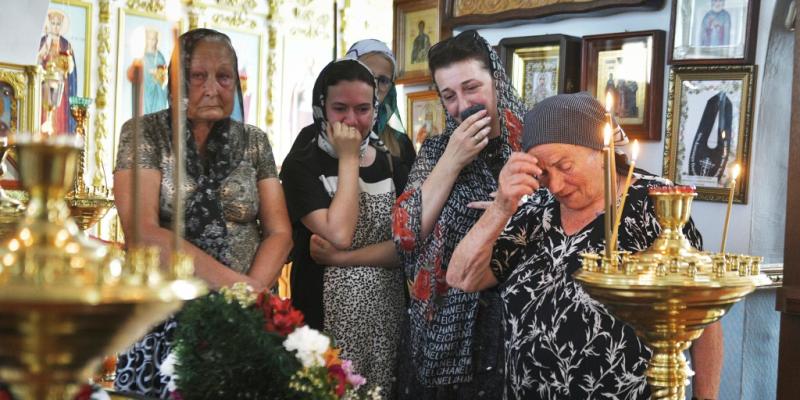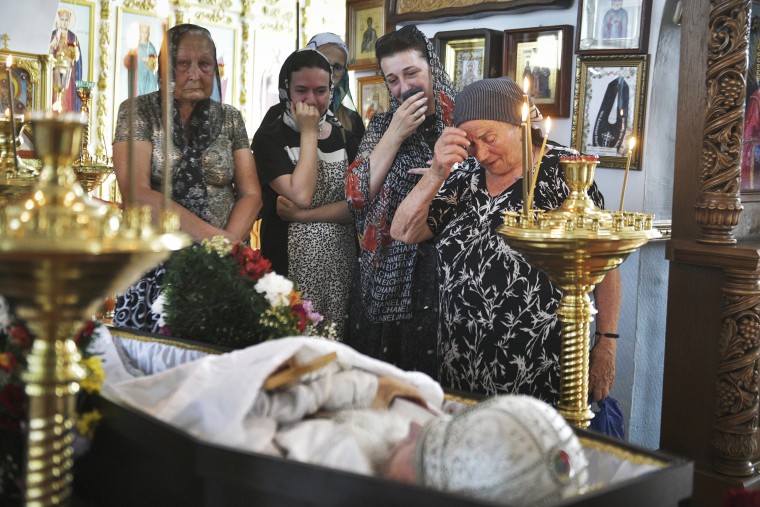Dagestan attacks: Is Putin's Ukraine war distracting from Islamist threat in Russia?



Nobody has yet claimed responsibility for the deadly attacks on two synagogues and Orthodox churchesthat shook southern Russia on Sunday.
Sixteen law enforcement officers, an Orthodox priest and several civilians were killed in raids in the predominantly Muslim region on the Orthodox Christian holy day of Pentecost, but the Kremlin has sought to downplay the prospect that Islamist militants were behind it.
Its attempts to distract from a possible connection may hint at the growing vulnerability of President Vladimir Putin, whose attention and resources are focused squarely on the war in Ukraine and those who oppose it inside Russia.
Kremlin-linked politicians have suggested without evidence that the attacks have been organized by "enemies" from abroad, specifically intelligence services of Ukraine and NATO, although Putin himself has not directly addressed the attacks.
 Women stand at the coffin of Orthodox priest Father Nikolay Kotelnikov, killed by armed militants in Derbent, Dagestan during his funeral on Tuesday.AP
Women stand at the coffin of Orthodox priest Father Nikolay Kotelnikov, killed by armed militants in Derbent, Dagestan during his funeral on Tuesday.AP
It's the same narrative that was used just a few months ago when armed militants killed 145 people at the Crocus City Hall concert venue near Moscow, even though an affiliate of the Islamic State claimed responsibility.
Instead of investigating how Russia's intelligence services could have missed an attack of such significance, Moscow immediately accused Kyiv and its Western allies of helping to orchestrate it. Such accusations reinforce the Kremlin's public narrative that the West is the biggest existential threat to the security of ordinary Russians.
But two major terrorist attacks happening so close together "will raise questions about whether the war in Ukraine has distracted the Kremlin from what is happening inside Russia," said Neil Melvin, the director of international security studies at the Royal United Services Institute, a London-based think tank.
Melvin added that the re-emergence of violence in Dagestan this week is a threat to regional stability in the North Caucasus and to Putin's claim to have restored order there.
The Kremlin did not always try that hard to quash narratives around violent Islamism.
Dagestan is a predominantly Muslim region of Russia in the North Caucasus. Extremist violence increased there in the early 2000s in the wake of two wars waged by Russian forces in neighboring Chechnya. Those conflicts allowed Putin to claim to have brought peace and stability to the turbulent region and burnish his image as Russia's guarantor of security.
But more recently, Dagestan — like other ethnic minority regions — has borne the brunt of Putin's sometimes unpopular efforts to mobilize men for the Ukraine war. The region also made headlines in October when an anti-Israeli mob stormed the airport in the Dagestan capital of Makhachkala after a passenger flight arrived from Israel just weeks after the Oct. 7 attack.
In the past, the Kremlin has blamed "international terrorism" and "jihadism" for fresh outbreaks of violence in Russia's Caucasus, bringing it in line with Western countries facing similar threats, said Michael Clarke, a visiting professor of war studies at King's College London. "But since 2022, the Kremlin has worked hard to imply that these attacks are somehow inspired from outside and more specifically that they lead back to Kyiv, however tenuously," he said.
On Monday, Dagestan Gov. Sergei Melikov suggested authorities knew who was behind the attacks and what their goals were, but he stopped short of naming any perpetrators, mentioning only what he said were internationally controlled "sleeper cells."
Opaque and mixed messaging has also been a feature of official responses to previous terrorist attacks on Russian soil.
Days after the Crocus City Hall attack in March, Putin said it was carried out by "radical Islamists" but questioned who directed them. Two weeks after that, he said Russia could not have been targeted by "Islamic fundamentalists" because it's a "unique example of interfaith agreement and unity."
The denial may have meant "the security services' distraction by the war in Ukraine was not amended after the Crocus City Hall attack," said Harold Chambers, a political analyst specializing in Russia at Indiana University Bloomington.
Notably, after Sunday's attack, Russian state media reported that a local official, Magomed Omarov, had been relieved of his post and expelled from the ruling United Russia party. Those reports claimed that Omarov's son and nephew took part in the attacks. The allegations, if true, will raise uncomfortable questions for the Kremlin.
"The higher status of the most recent Dagestan militants indicates that the counterterrorism landscape in the North Caucasus has shifted significantly," Chambers said.
State Department spokesperson Matthew Miller told reporters Monday he did not have any assessment of who perpetrated the attack. Three U.S. officials told NBC News that no branch of ISIS has publicly taken credit for the attack but that other local extremist groups may be responsible.
Telegram channels associated with the ISIS affiliate group that carried out the attack at Crocus praised Sunday's attack by "our brothers from the Caucasus," but they did not claim responsibility.
The Washington-based Institute for the Study of War argued that the Islamic State group's North Caucasus branch, Vilayat Kavkaz, likely was behind the attack, describing it as "complex and coordinated."



It's the same narrative that was used just a few months ago when armed militants killed 145 people at the Crocus City Hall concert venue near Moscow, even though an affiliate of the Islamic State claimed responsibility..
"Militants"?
Well thank goodness they were only "militants" and not actual terrorists.!
Yes, there appears to be a habit these days about calling terrorists "militants" - it helps to encourage the protesters who are supporting Hamas to give false credence to their claims.
"Militants"?
Well thank goodness they were only "militants" and not actual terrorists.!
Oooops-- my apologies! I "inadvertently" left out the /sarcasm tag!
Apology accepted. Now write on the blackboard 100 times: "I will not forget to post a sarcasm tag again."
Unfortunately, putting the sarc tag on does not do a lot of difference sometimes. I have been ticketed on more than one occasion by mods for taunting even with the sarc tag included.
The biggest pitfall is when a comment contains the word "you" and it doesn't matter if the sarc tag is used or not - it's damn well still going to get deleted, and rightly so.
The perps of the Boston Marathon bombing of 2013 were also from families that had roots in Dagestan.
Dzhokhar Tsarnaev had arrived in the United States with his parents in 2002, and Tamerlan joined them a year later. Prior to their immigration to the U.S., the ethnic Chechen family had lived in Kyrgyzstan and the Russian republic of Dagestan .
Well, now THAT explains it.
False flag operation set up by Russian security services that may have paid ISIS to claim responsibility? Then Russia blames the West while trying to claim the moral high ground to the Russian populace. Sounds like something Putin would try.
You really think Putin wants his own people to question his leadership any more than they already are?
Pinning this on Ukraine (who are slimy in their own right conducting operations in Africa and the ME against the Wagner group; as well as attacks in the Russian motherland) is a sign of desperation. It is also the reason Russian troops have stopped surrendering and are fighting like their lives depend on it. Ukraine hasn't learned anything from history it seems.
He really needs to think what is worse. A terrorist group operating freely; or Ukraine and NATO being able to orchestrate operations that deep inside Russia. Which would mean he isn't winning the war in Ukraine by any stretch of the imagination; and that Russia is vulnerable.
Either way his control on Russia should be slipping. Someone in his inner circle must have designs on the top spot by now. If not then Putin has surrounded himself with weak, incompetent, pathetic yes men- and it will take Russia even longer to recover once his rule ends.
From everything I've read...I don't think he really worries about that very much . . .if at all.
Given that they are defending their homeland against a foreign invasion (and recently not doing very well at that) I doubt if they are focusing much time or energy on operations in a foreign land.
And Africa-- of all places? Seriously, don't you realize Ukrainians have priorities other than diddling around in Africa?
Consider this: Putin may be considerably less rational than you give him credit for....